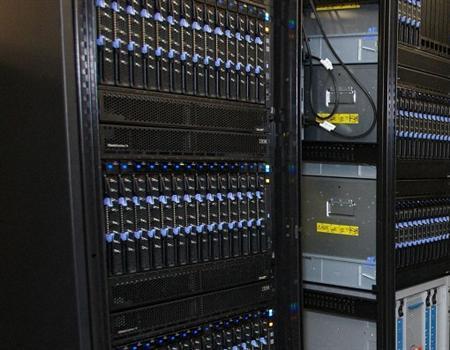Photographs: Handout/Reuters BS Reporter in Mumbai/Pune
Chip maker NVIDIA in collaboration with Institute of Technology, Delhi is setting up a research lab to help the country reach its goal of achieving exascale computing by 2017.
The new Exascale Research Lab, co-developed by NVIDIA and IIT Delhi, will help the nation achieve this goal by providing advanced ongoing research, testing, and technology development in a variety of areas,including processor architecture,circuits, memory architecture, high-speed signaling, programming models, algorithms, and applications.
The Indian government has proposed major investments to upgrade the country's supercomputing infrastructure and develop a supercomputer.
The lab will also apply its work to address next-generation scientific challenges in computer science, nanotechnology, material science, power engineering, and other domains.
"The Exascale Research Lab can potentially help India leapfrog ahead in the supercomputing world. Its high-performance, energy efficient NVIDIA GPU accelerators will enable Indian researchers to build next-generation supercomputing technologies while maximising costs and power savings - a critical challenge to overcome for the success of any exascale initiative," said Vishal Dhupar, managing director of NVIDIA India.
The development of exascale computing systems, which would be hundreds of times faster than most of today's petascale systems, will enable unprecedented innovation and breakthroughs in biology, earth sciences, genomics, life sciences, medicine, materials science, energy,national security, and many other scientific domains.
"NVIDIA and IIT Delhi share the common vision of developing technologies that boost computing performance to exascale levels in order to help find solutions to next-generation problems," said Dr Subodh Kumar, Professor, Department. of Computer Science & Engineering at IIT Delhi.
"Working with NVIDIA presents significant opportunities for innovation. The pool of talent available at our institute coupled with the access to the latest GPU technology is a promising prospect that will surely propel our race to creating radical, ground-breaking technologies."
Commenting on this in Pune, Dr Vijay Bhatkar, a supercomputer expert and former director C-DAC said: " The future lies in low-cost, low-power computing. Huge power consumption remained the main challenge for these machines, exascale computing requires breakthrough innovation and re-designing of processors. The country had crossed the petaflop computer range and needs exascale computers, which are machines capable of performing 1000 trillion operations a second."
IIT Delhi will provide the infrastructure for the Exascale Research Lab, including software and computing systems, and will maintain an active research program on exascale development and GPU computing. In addition to GPU accelerators, NVIDIA will provide access to its supercomputing and scientific application domain expertise and marketing support.



article